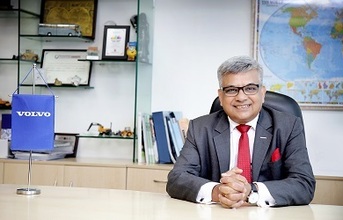
Kamal Bali, President & MD, Volvo Group India
Electric mobility
Globally, Volvo group has already delivered over 4,000 electrified buses across various markets. So, it's not a concept anymore in the case of the Group. In India, there is good ambition and various steps are being taken. "In fact, Volvo was the first to deliver hybrid buses [to Navi Mumbai]. We remain deeply engaged with electric bus stakeholders and we are closely following the development of the eco-system and the requirements for the India circumstances. It's a matter of finding the right market condition, where we can bring in a commercially viable solution for the long-term," Bali states.
Sustainability Development
Whether it is the transition to the Bharat Stage VI emission norms or whether it is the progress towards electric mobility, these are the manifestations of the society's focus on sustainable development. So, how does Volvo Group see it in its own context? Bali acknowledges that there is a clear demand emerging from customers and authorities for solutions that are sustainable. "I think businesses will not be viable if we do not cater to the aspect of sustainability. Nations and societies have become increasingly serious with regard to resource scarcity, global warming and cities which are increasingly congested and polluted. The fifth cause of death in 2030 will be traffic accidents, passing HIV/Aids and malaria. As for air quality, only 12 percent of the people living in cities reside in cities which comply with WHO air quality guideline levels. About half of the urban population being monitored is exposed to noise pollution that is at least 2.5 times higher than the WHO recommendations," he explains.
Incidentally, the Volvo Group was the first company to declare its environment charter at the 1972 UN Stockholm conference on environment. "Today, we are signatories to the United Nations (UN) Global Compact, partner in the WWF Climate Savers program, and supporter of the UN 2030 Agenda for Sustainable Development. Driving prosperity through transport solutions - our mission - demands that we keep in focus our entire value chain activities, the sustainable nature of our transport solutions and the way we operate as a corporate citizen," Bali informs.
Bali emphasizes that Volvo Group remains deeply committed in the arena of sustainable development and there is much progress being made on how the Group is leading and dealing with the future of sustainable transport. "Back in 2007, Volvo Group actually displayed seven different fuels on seven different commercial vehicles. The message was - we can be ready with the solution, but we need directions from government and the authorities across the world," he adds with a smile.
(Continued on the next page)


























